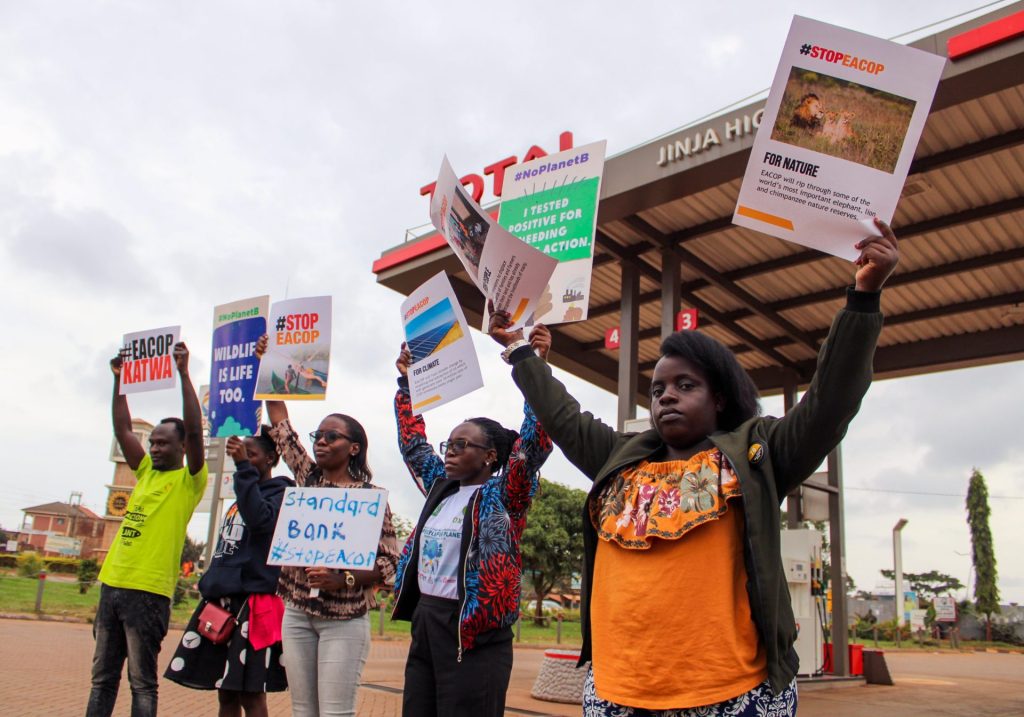
Laudato Si’ Movement is gravely concerned following the recent endorsement of the East African Crude Oil Pipeline (EACOP) project by the Tanzania Episcopal Conference in a video posted on the conference’s website and youtube channel.
The East African Crude Oil Pipeline (EACOP) is a proposed pipeline that would transport crude oil from Uganda’s oil fields to the Tanzanian port of Tanga. The EACOP would contribute significantly to greenhouse gas emissions and exacerbate the climate crisis. In a recent message from The Holy Father, Pope Francis, for the celebration of the World Day of Prayer for the Care of Creation, he emphasised the importance of adhering to the commitments outlined in the Paris Agreement to mitigate global warming.
Pope Francis deemed it nonsensical to allow the ongoing exploration and expansion of fossil fuel infrastructures. He urged individuals to speak out against this injustice, particularly its impact on the underprivileged and future generations, who will bear the brunt of climate change’s adverse effects. The Pope appealed to people of goodwill to align their actions with these principles regarding society and nature.
The Intergovernmental Panel on Climate Change’s (IPCC) latest report warns that the world must urgently reduce emissions to limit global warming to 1.5°C above pre-industrial levels and prevent the most catastrophic impacts of climate change.
Furthermore, according to the report on the Public Hearing on the Environmental and Social Impact Assessment (ESIA) of the EACOP Project, the EACOP project poses significant environmental and social risks. The pipeline would cross sensitive ecosystems and wildlife habitats, such as the Lake Victoria Basin, Murchison Falls, and the Serengeti Plains, and could cause water pollution and biodiversity degradation. The project could also displace local communities, threaten their livelihoods, and violate human rights.
The recent visit of Pope Francis to the Democratic Republic of Congo emphasised the need for global solidarity to phase out fossil fuels and transition towards renewable energy. This transition is critical to address the climate crisis and its impacts on vulnerable communities already suffering the consequences of extreme weather events, sea level rise, and food insecurity.
“I stand in solidarity with fellow Catholic environmentalists and advocates worldwide who uphold the teachings of Laudato Si’ and strive to implement sustainable practices within their local communities. Together, let us humbly appeal to our bishops to reconsider their position on the EACOP project and to engage in meaningful dialogue and discernment that aligns with the urgent need to protect our planet for current and future generations.” says John Hillary, the chapter leader of Laudato Si’ Movement in Uganda and a STOPEACOP activist.
“As a climate activist, I am shocked that TEC made the statement on EACOP. The TEC bishops are convinced by false solutions and they need to look at the other side of the coin. The project paints a picture of good economic development while the other side is the destruction of the environment. 80% of this pipeline passes through Tanzania and will lead to so much greenhouse gas emissions, and potentially pollute over 200 rivers. This heated pipeline with harm the environment.” says Rehema Peter, founder of the Tanzanian Partnership for Green Future organisation and a Laudato Si’ animator.
“TEC is a respectful and significant institution that is the voice of the church of Tanzania. TEC also hosted the AMECEA plenary last year and resolved to implement Laudato Si.” she adds, “ I urge them to independently look at the EACOP issue again while considering the science and research while comparing it to Laudato Si’ which is a message to the whole world.”
The scientific evidence is clear that nations must phase out fossil fuels to prevent catastrophic climate change. According to the United Nations Environment Programme’s report “Making Peace with Nature,” the world must achieve net-zero greenhouse gas emissions by 2050 to limit global warming to 1.5°C and protect the planet’s ecosystems and biodiversity. EACOP is estimated to produce over 379 million tonnes of CO2, according to a study by Banktrack, and is incompatible with the Paris Agreement.
At the AMECEA plenary session conducted in Dar Es Salaam, a commitment was established to pursue the restoration of “economic justice” and “equity.” This endeavour would commence by advocating for alternative energy sources such as solar and wind power. The bishops of AMECEA restated their readiness to cooperate with various institutions, NGOs, and faith-based communities in environmental preservation initiatives. They also pledged to carry out an extensive “awareness campaign” at the grassroots level to enhance communication and raise consciousness among individuals regarding these matters.
In light of these concerns, we at the Laudato Si’ Movement urge the bishops to reconsider their support for the EACOP project and advocate for a just transition away from fossil fuels. This transition requires investing in renewable energy and creating green jobs that support local communities and protect the environment. In his encyclical Laudato Si, Pope Francis expresses that we must begin with divestment from fossil fuels and redirect our resources to invest in sustainable energy [LS 26]. It is time for the Church to take bold action toward a sustainable future for all.
Laudato Si’ Movement Africa.
Nairobi, Kenya
Contacts:
Prince Papa
Programs Manager
[email protected]
Ashley Kitisya
Fossil Free Campaigner Africa
[email protected]





